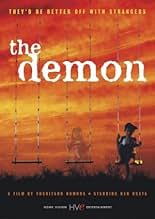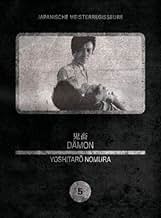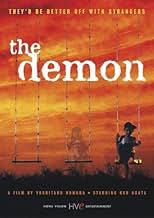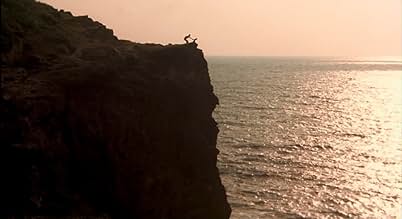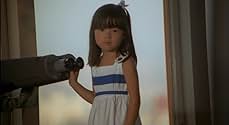PUNTUACIÓN EN IMDb
7,4/10
1 mil
TU PUNTUACIÓN
Un hombre casado deja de cuidar de su amante y ella abandona a sus tres hijos pequeños con él y su iracunda esposa.Un hombre casado deja de cuidar de su amante y ella abandona a sus tres hijos pequeños con él y su iracunda esposa.Un hombre casado deja de cuidar de su amante y ella abandona a sus tres hijos pequeños con él y su iracunda esposa.
- Premios
- 9 premios y 3 nominaciones en total
Argumento
¿Sabías que...?
- ConexionesReferences Kagaku ninja tai Gatchaman (1972)
Reseña destacada
Wicked stepmother stories, whether fairy tales or memoirs, usually come at us from the point of view of the child. Here the point of view floats. It almost never rests with a child, as three adults shunt not just children, hot potato-like, but also responsibility, blame, and guilt. Only Ken Ogata's Sochiki, possibly the "demon" of the title, the children's father, hesitates at the film's brutalities. Only he has the customary exculpatory back story (his own father and uncle
).
Is the father the title's "demon"? Before I read the DVD liner notes which I think imply the father, I assumed it was Sochiki's wounded but manipulating wife, Oume. She's unrelenting. Every time the camera lingers, as if anticipating some hint of even involuntary or innate womanly compassion, she disappoints. The kids fear her, but continually forgive their father. Few heartfelt villains are as lankily goofy as Ogata plays Sochiki. In more recent film language, meaning the J-horror trend, though I'm sure it wasn't Nomura's intent at all, the miraculously death-defying five-year-old Riichi, the oldest child, would have to be the demon. At times, Riichi, preternaturally wise at five, seems demon-like, obstacle-like, as chance, luck, and his own cunning or, more credibly, intuition, thwart every attempt to extinguish him. Camera angles looking at him through Sochiki's or Oume's eyes anachronistically mimic shots of demon children in the Ringu films, Ju-on, Tomie, etc., etc. I don't know what that means, or why it came to me here, but there it is. Maybe the "demon" is something human or societal floating between all Nomura's players.
Obvious touch points, each like this film based on a true incident, are Oshima's "Boy" (Shonen) and, though I've yet to see it, Kore-eda's "Nobody Knows" (Dare mo shiranai).
Is the father the title's "demon"? Before I read the DVD liner notes which I think imply the father, I assumed it was Sochiki's wounded but manipulating wife, Oume. She's unrelenting. Every time the camera lingers, as if anticipating some hint of even involuntary or innate womanly compassion, she disappoints. The kids fear her, but continually forgive their father. Few heartfelt villains are as lankily goofy as Ogata plays Sochiki. In more recent film language, meaning the J-horror trend, though I'm sure it wasn't Nomura's intent at all, the miraculously death-defying five-year-old Riichi, the oldest child, would have to be the demon. At times, Riichi, preternaturally wise at five, seems demon-like, obstacle-like, as chance, luck, and his own cunning or, more credibly, intuition, thwart every attempt to extinguish him. Camera angles looking at him through Sochiki's or Oume's eyes anachronistically mimic shots of demon children in the Ringu films, Ju-on, Tomie, etc., etc. I don't know what that means, or why it came to me here, but there it is. Maybe the "demon" is something human or societal floating between all Nomura's players.
Obvious touch points, each like this film based on a true incident, are Oshima's "Boy" (Shonen) and, though I've yet to see it, Kore-eda's "Nobody Knows" (Dare mo shiranai).
- frankgaipa
- 6 mar 2005
- Enlace permanente
Selecciones populares
Inicia sesión para calificar y añadir a tu lista para recibir recomendaciones personalizadas
Detalles
Contribuir a esta página
Sugerir un cambio o añadir el contenido que falta

Principal laguna de datos
By what name was El demonio (1978) officially released in Canada in English?
Responde
